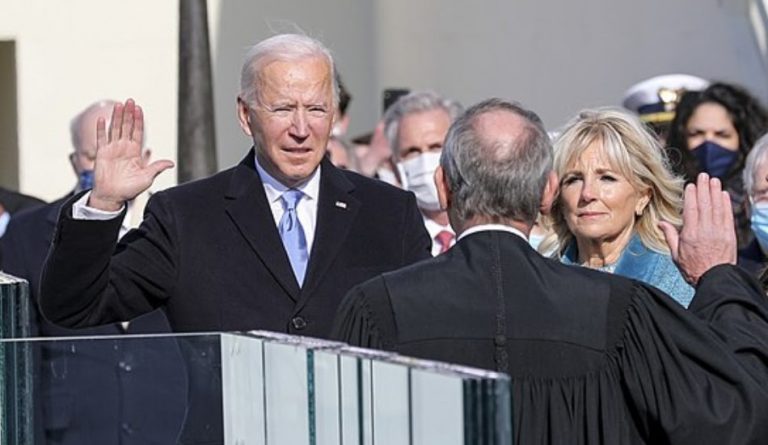On Jan. 20, Joe Biden took the oath to become the 46th President of the United States. Due to security concerns, no crowd was present at his inaugural address. Instead, organizers planted thousands of American flags. Vice President Kamala Harris was also sworn into office. The ceremony was attended by former presidents Bill Clinton, George Bush, and Barack Obama. In addition, lawmakers from both chambers of Congress attended the event. The national anthem was sung by Lady Gaga.
“My whole soul is in this, bringing America together, uniting our people, uniting our nation, and I ask every American to join me in this cause… Uniting to fight the foes we face: anger, resentment and hatred, extremism, lawlessness, violence, disease, joblessness, and hopelessness. With unity, we can do great things, important things,” Biden said in his inaugural speech. Despite his promise of unity, many of the executive orders Biden has signed will likely divide American society.
Immigration: Biden signed an executive order that mandates the U.S. Census Bureau to include illegal immigrants in apportionment. This contrasts with the Trump administration’s move to exclude illegal aliens. Apportionment is the process by which the number of representatives is set; states with higher populations get more seats. By including illegal immigrants, Democrats are trying to secure their voting base. In addition, Biden terminated an emergency declaration at the southern border. He ordered the funds for the construction of the border wall to be redirected toward other efforts.
He also passed a memo to strengthen the Deferred Action for Childhood Arrivals (DACA) program. Biden sent a draft bill titled “U.S. Citizenship Act of 2021” to Congress that seeks to approve citizenship for almost 11 million illegal immigrants.

Republican Senator Ted Cruz criticized Biden’s flurry of immigration reforms, warning that it will come at the expense of American jobs and workers. Republican House leader Kevin McCarthy called the immigration push “an affront to the rule of law.”
Success
You are now signed up for our newsletter
Success
Check your email to complete sign up
Oil pipeline: Biden revoked the construction permit of the Keystone XL pipeline project. First proposed in 2008, it was blocked by the Obama regime. But during the Trump administration, the project was revived. Andy Black, CEO of the Association of Oil Pipelines, said that banning the Keystone XL project will kill 10,000 jobs and take out $2.2 billion in payroll from the pockets of American workers. Keystone XL President Richard Prior said that more than 1,000 jobs will be lost in the next few weeks.
Paris Agreement and WHO: Biden signed an executive order that will rejoin the U.S. to the Paris Climate agreement in the next 30 days. Trump had pulled America out of the agreement, calling it a “total disaster” for the American economy. Biden also plans to rejoin the U.S. with the World Health Organization. Trump had exited America from the WHO after the organization failed to properly handle the CCP virus outbreak.
Racial agenda: A Jan. 20 release by the Biden team stated that Biden will sign several documents to “advance racial equity.” The concept of equity is rooted in the idea of creating equality of outcome rather than equal opportunity.
“The Executive Order will define equity as the consistent and systematic fair, just, and impartial treatment of all individuals, including individuals who belong to underserved communities, such as Black, Latino, Indigenous and Native American persons, Asian Americans and Pacific Islanders, and other persons of color; LGBTQ+ persons; people with disabilities; religious minorities, persons who live in rural areas; and persons otherwise affected by persistent poverty or inequality,” the release stated. Biden also plans on instructing federal agencies to review and address barriers to equity within the departments.
Follow us on Twitter or subscribe to our email list
















